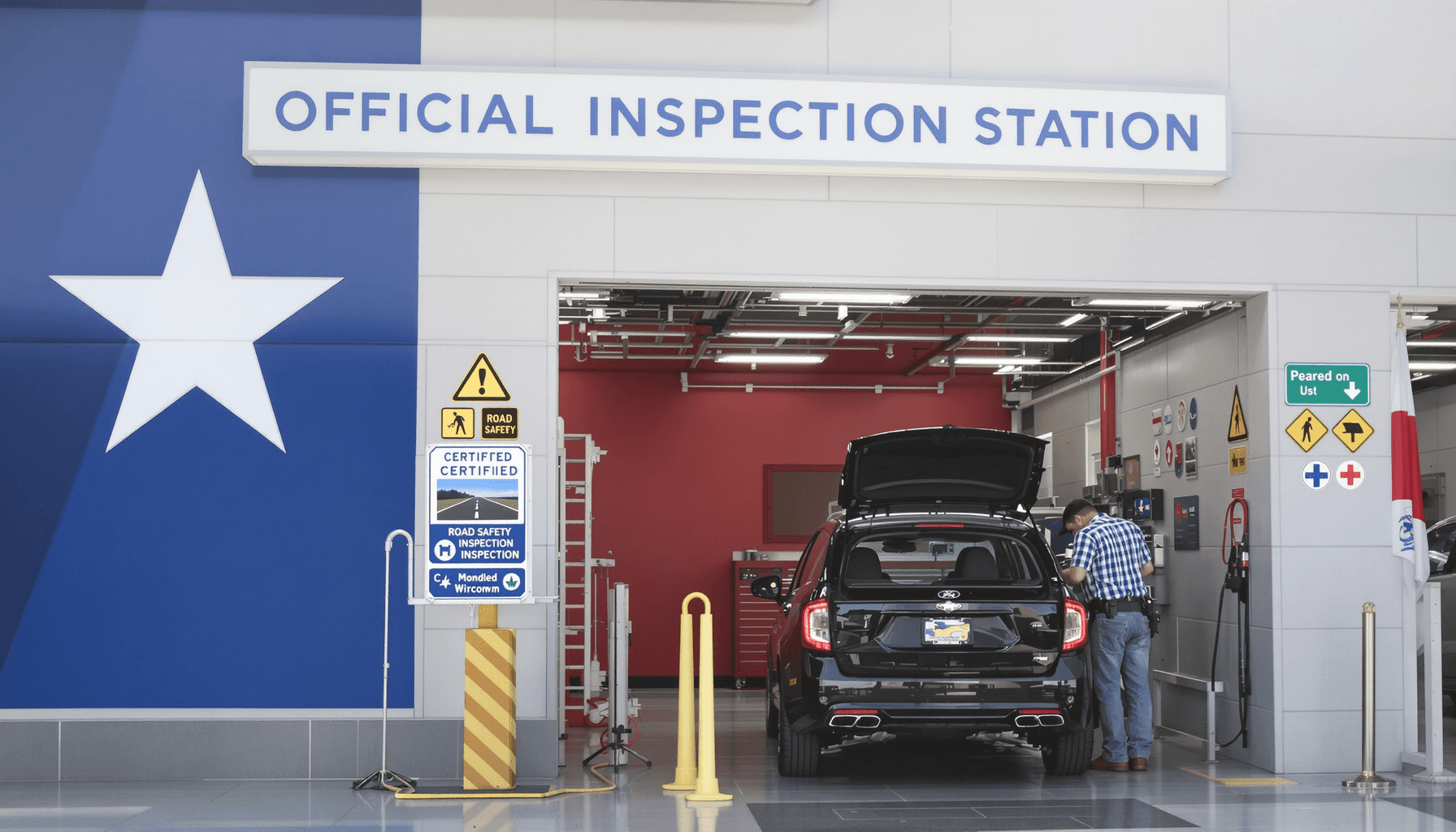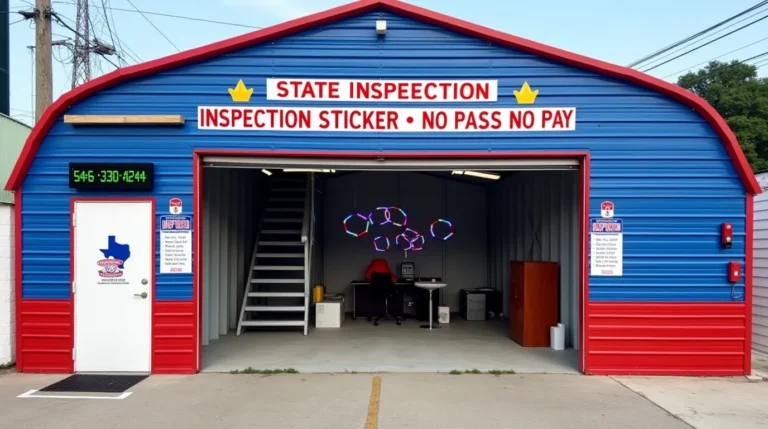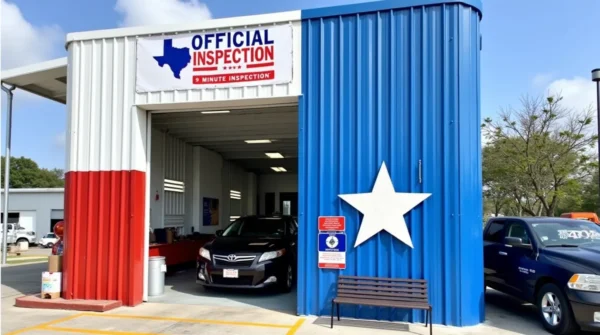
Sticker Plus – Official Vehicle Inspections in Texas 2025
Sticker Plus is a trusted official vehicle inspection station in Texas, dedicated to ensuring the safety and compliance of vehicles across the state. As a certified inspection facility, our team of skilled technicians conducts thorough evaluations of vehicles to meet state-mandated safety standards.
A significant change in Texas vehicle inspection regulations will take effect on January 1, 2025. House Bill 3297, passed by the Texas Legislature in 2023, eliminates mandatory safety inspections for non-commercial vehicles. This change marks a new era in Texas vehicle safety oversight.
Key Changes for Texas Vehicle Owners:
- Non-commercial vehicles no longer require safety inspections
- Annual $7.50 inspection program replacement fee introduced
- Emissions testing continues in designated counties
- Commercial vehicles maintain inspection requirements
Vehicle safety remains crucial despite these regulatory changes. Regular maintenance checks of critical components protect drivers, passengers, and fellow road users. Essential safety features requiring consistent attention include:
- Brake systems
- Tire condition and pressure
- Headlights and taillights
- Windshield wipers
- Steering mechanisms
- Horn functionality
Sticker Plus is committed to vehicle safety through professional inspection services during this transition period. Our expertise helps vehicle owners ensure their automobiles meet safety standards, preserving road safety for all Texans.
Table of Contents
Evolution of Vehicle Inspection Programs in Texas
Texas vehicle inspection programs trace their roots back to 1925, when the state first mandated safety checks for motor vehicles. The initial curriculum emphasized fundamental safety components such as brakes, lights, and horns. Through the decades, these inspections grew more comprehensive, adapting to advancing automotive technology and increasing environmental concerns.
Key Historical Milestones:
- 1951: Texas established annual inspection requirements
- 1986: Emissions testing introduced in major urban areas
- 2013: Implementation of Two Steps, One Sticker program
- 2025: House Bill 3297 takes effect
House Bill 3297 introduces a major change in Texas vehicle inspection regulations. Beginning January 1, 2025, this law removes the requirement for mandatory safety inspections on non-commercial vehicles. This marks a significant shift in how the state manages vehicle safety oversight.
Changes Under House Bill 3297:
- Elimination of annual safety inspections for personal vehicles
- Introduction of $7.50 inspection program replacement fee
- Continuation of emissions testing in designated counties
- Maintained requirements for commercial vehicles
The choice to revise the inspection program is based on multiple considerations:
- Cost Efficiency: Research indicates little connection between mandatory inspections and a decrease in accidents.
- Resource Allocation: Streamlining government operations and reducing administrative burden
- Modern Vehicle Technology: Many newer cars come equipped with advanced safety systems, lessening the necessity for frequent inspections.
- Economic Benefits: This change helps Texas vehicle owners save both time and money.
Despite the changes brought by House Bill 3297, it’s important to note that emissions testing will still be conducted in certain areas. For more information on this aspect, you can visit this frequently asked questions page.
The evolution of the inspection program highlights shifting priorities in managing vehicle safety. Although personal vehicles will no longer require mandatory physical inspections, the state continues to prioritize road safety through other strategies and maintains strict oversight of commercial vehicles.
Services Offered by Sticker Plus

Sticker Plus offers extensive vehicle inspection services throughout Texas via a network of conveniently located centers:
Essential Vehicle Inspections
- Annual safety inspections for passenger vehicles
- Commercial vehicle safety certifications
- Emissions testing for designated counties
- Pre-purchase inspection assessments
- Specialty vehicle inspections
Quick Service Promise
The average inspection at Sticker Plus takes 15-20 minutes, allowing you to maintain your busy schedule. Our streamlined process includes:
- Digital documentation system
- Multiple inspection lanes
- Real-time results reporting
- Instant sticker printing
Convenient Locations
Sticker Plus inspection stations feature:
- Easy highway access
- Ample parking space
- Extended operating hours
- Multiple service bays
- Digital appointment scheduling
Advanced Equipment & Expertise
Our facilities are equipped with:
- OBD-II diagnostic scanners
- Digital brake testing systems
- Advanced emissions testing equipment
- Certified lighting inspection tools
Professional Staff
Each Sticker Plus inspector brings:
- State certification
- Continuous technical training
- Extensive automotive knowledge
- Customer service excellence
What sets Sticker Plus apart is our dedication to accuracy and efficiency. Our cutting-edge facilities, paired with experienced professionals, ensure comprehensive inspections are completed promptly with minimal wait times. We maintain rigorous quality standards while providing clear communication throughout the inspection process.
Our digital platform monitors your vehicle’s inspection records and provides timely alerts for renewal deadlines. This proactive system assists vehicle owners in staying compliant with Texas laws while maintaining road safety.
Transition Period Before 2025

Texas vehicle owners will see notable changes in inspection regulations as 2025 approaches. To continue funding key road safety programs, the state has implemented a $7.50 annual replacement fee in place of the traditional inspection.
Replacement Fee Structure
This replacement fee structure includes:
- Standard Vehicles: $7.50 annual fee
- New Vehicle Purchases: $16.75 initial fee (covers first two years)
- Commercial Vehicles: Exempt from replacement fee
Purpose of Collected Fees
The fees collected from vehicle owners will directly fund critical state programs aimed at promoting safety and sustainability:
- Road safety education initiatives
- Environmental protection measures
- Infrastructure maintenance
- Law enforcement training
- Emergency response services
How Funds Are Allocated by the Texas Department of Public Safety
The Texas Department of Public Safety (DPS) oversees the management and distribution of these funds, directing them toward key safety initiatives such as:
- Traffic Safety Programs: 35% of revenue
- Environmental Protection: 25% of revenue
- Infrastructure Development: 20% of revenue
- Emergency Services: 20% of revenue
Impact on New Vehicle Owners
For new vehicle owners, the initial fee of $16.75 covers a two-year period, reflecting both the longer coverage duration and the lower risk of safety concerns in newer vehicles. This streamlined fee structure simplifies the process for recent purchases while ensuring steady funding for safety initiatives.
Payment Options for Replacement Fees
Vehicle owners can choose from several convenient methods to pay their replacement fees:
- Online payment portals
- County tax offices
- Authorized payment centers
- Mail-in options
Support from Sticker Plus during Transition
Sticker Plus continues to assist vehicle owners during this transition by offering various services:
- Providing guidance on fee requirements
- Offering inspection services for commercial vehicles
- Maintaining records of previous inspections
- Supporting compliance with existing regulations
The replacement fee system provides consistent funding for vital safety programs while streamlining the experience for vehicle owners. This organized framework strengthens Texas’s dedication to road safety by ensuring targeted resource allocation and sustained program support.
Emissions Testing Requirements Post-2025

Texas will see major updates to vehicle emissions testing in 2025, with requirements differing by county. While safety inspections for non-commercial vehicles are being phased out, emissions testing will continue to play a key role in ensuring compliance in specific regions.
Key Counties Requiring Emissions Testing:
- Dallas-Fort Worth Metroplex
- Houston-Galveston Region
- El Paso Area
- Travis County
- Williamson County
- Bexar County (Starting 2026)
Starting in 2026, Bexar County will be added to Texas’s emissions testing program, reflecting the state’s ongoing commitment to environmental protection. Residents will need to complete emissions tests at approved locations—such as Sticker Plus—to keep their vehicle registration current.
Testing Requirements by Vehicle Type:
- Gasoline-powered vehicles: 2-24 years old
- Diesel vehicles: 2-24 years old
- Hybrid vehicles: Subject to standard emissions testing
- Electric vehicles: Exempt from emissions testing
Commercial vehicles maintain distinct requirements under the new program. While these vehicles must continue safety inspections, they receive exemption from the inspection program replacement fee. This exemption helps balance regulatory compliance with operational costs for business owners.
Testing Components:
- On-Board Diagnostic (OBD) System check
- Tailpipe emissions measurement
- Visual inspection of emissions control devices
- Fuel cap pressure test
The emissions testing process at Sticker Plus utilizes advanced diagnostic equipment to measure:
- Carbon monoxide levels
- Hydrocarbon emissions
- Nitrogen oxide output
- Particulate matter
Vehicle owners in emissions counties must complete testing prior to registration renewal. Results transmit directly to the Texas Department of Motor Vehicles database, streamlining the registration process. Sticker Plus provides same-day testing services with certified technicians trained in the latest emissions testing protocols.
Emissions testing plays a vital role in mitigating environmental impact by regulating harmful pollutants released by vehicles. For more information on how transportation contributes to air pollution and climate change, visit this EPA resource.
The Role of Vehicle Maintenance in Ensuring Road Safety
Regular vehicle maintenance remains a cornerstone of road safety, regardless of changing inspection requirements. A well-maintained vehicle protects both drivers and other road users from preventable accidents and mechanical failures.
Essential Vehicle Components Requiring Regular Checks:
- Brake System: Brake pad thickness, brake fluid levels, rotor condition, emergency brake functionality
- Tire Maintenance: Proper inflation pressure, tread depth measurement, wheel alignment, rotation schedule
- Lighting Systems: Headlights (high and low beam), brake lights, turn signals, emergency flashers
Recommended Maintenance Schedule:*
- Monthly Checks: Tire pressure, all exterior lights, windshield washer fluid, engine oil level
- Quarterly Inspections: Brake system, battery connections, belt conditions, fluid levels
- Annual Service: Suspension components, steering system, exhaust system, air filters
Vehicle owners can prevent costly repairs by identifying potential issues early through routine maintenance. A systematic approach to vehicle care helps maintain optimal performance levels and extends vehicle lifespan.
Safety Benefits of Regular Maintenance:*
- Reduced risk of mechanical failures
- Better fuel efficiency
- Enhanced vehicle handling
- Improved braking response
- Reliable operation in emergency situations
Professional mechanics recommend keeping detailed maintenance records and following manufacturer-specified service intervals. These practices help track vehicle health and ensure critical safety features function properly throughout the vehicle’s lifecycle.
Future Prospects for Sticker Plus as an Official Vehicle Inspection Station
Sticker Plus maintains a strong position in Texas’s vehicle inspection landscape, offering promising career paths for automotive professionals. The 2025 program changes create specialized opportunities for skilled inspectors focused on commercial vehicle inspections and emissions testing.
Key Career Opportunities at Sticker Plus:
- Lead Vehicle Inspector: Oversee inspection operations and ensure compliance with state regulations
- Emissions Testing Specialist: Focus on environmental compliance testing in designated counties
- Commercial Vehicle Inspector: Specialize in comprehensive safety inspections for commercial fleet vehicles
- Quality Assurance Technician: Maintain inspection equipment and verify testing accuracy
Professional Development Benefits:
- State-certified training programs
- Hands-on experience with diverse vehicle types
- Advanced diagnostic equipment expertise
- Regular updates on industry regulations
The career path at Sticker Plus includes competitive compensation packages and growth opportunities. Entry-level inspectors can advance to senior positions through demonstrated expertise and additional certifications.
Work Environment Advantages:
- Modern facility with state-of-the-art equipment
- Stable work schedule with consistent hours
- Professional team environment
- Direct interaction with diverse clientele
Sticker Plus invests in employee development through:
“We prioritize continuous learning and professional growth. Our inspectors receive regular training updates and access to the latest automotive technology” – Sticker Plus Management
The focus on commercial vehicle inspections creates job security, as these requirements remain mandatory under Texas law. Emissions testing specialists become increasingly valuable with expanded testing requirements in metropolitan areas.
Required Qualifications:
- Valid Texas driver’s license
- High school diploma or equivalent
- Technical certification in automotive technology
- Strong attention to detail
- Customer service skills
Interested candidates can apply through the Sticker Plus website or visit local facilities for information about current openings and apprenticeship programs.
FAQs (Frequently Asked Questions)
What is Sticker Plus and its role in Texas vehicle inspections for 2025?
Sticker Plus is an official vehicle inspection station in Texas that provides comprehensive vehicle safety inspections. It plays a key role in implementing the updated vehicle inspection program starting in 2025, ensuring vehicles meet state safety standards.
How has House Bill 3297 impacted non-commercial vehicle safety inspections in Texas?
House Bill 3297 has led to significant changes in the Texas vehicle inspection program, particularly affecting non-commercial vehicles by modifying inspection requirements to enhance efficiency while maintaining safety standards.
What services does Sticker Plus offer for vehicle inspections?
Sticker Plus offers a range of inspection services including various types of safety and emissions inspections. They emphasize convenience with multiple accessible locations, quick turnaround times, expert staff, and state-of-the-art equipment to ensure efficient service.
What is the $7.50 annual inspection program replacement fee during the transition period before 2025?
During the transition period before 2025, vehicle owners pay a $7.50 annual inspection program replacement fee. This fee supports state programs and operations related to road safety and environmental protection, with different fees applied for new versus older vehicles purchased in Texas.
What are the emissions testing requirements post-2025, especially for counties like Bexar County?
After 2025, emissions testing requirements will be enforced in specific Texas counties such as Bexar County. These regulations include exemptions for certain commercial vehicles from some inspection fees under the new program to balance environmental goals with business needs.
Why is regular vehicle maintenance important despite changes in the inspection program?
Regular vehicle maintenance remains critical for road safety even with updated inspection protocols. Key components such as brakes, tires, and lights require consistent servicing to ensure optimal performance and prevent accidents on Texas roads.
